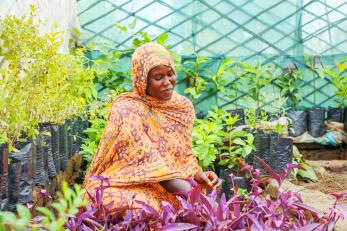Market Systems in the Sudan Crisis

When conflict erupted in Sudan in April 2023, it interrupted the progress of Mercy Corps’ Swedish-International-Development-Agency-(SIDA)-funded Strengthening Agricultural Markets and Food Security (SAFE) Program. SAFE aimed to sustainably improve the lives of small-holder farmers by utilizing market systems approaches to increase private sector investment. Mercy Corps and SIDA utilized the lessons learned and relationships built during SAFE to continue supporting communities through the crisis, protect the development gains made, and plant the seeds of recovery. One year after the outbreak of violence, this paper reflects on the program’s initial pivot and extracts lessons on how systems approaches may affect program outcomes before and during a crisis response.
Before the conflict erupted:
- SAFE worked to strengthen market relationships and incentives in an environment where humanitarian distributions undercut the development of local business networks for rural and displaced populations.
- Despite the challenging pre-conflict context, 40,000 farmers purchased seeds, with 25% of those unsubsidized; their yields increased by 37%; and the volume of crops sold more than doubled. Women sold almost nine times the volume of crops after interacting with the SAFE program and its private sector partners.
After conflict erupted:
- SAFE’s pre-existing relationships with agri-businesses, microfinance institutions (MFI), and their agents allowed them to move fast to respond to the unexpected shock–getting some seeds to communities that humanitarian actors were unable to access and pivoting with a local microfinance institution to pilot cash distributions.
- Diverse and wide partnerships were key in pivoting quickly and effectively. The scale of the unexpected shock halted business in the initial conflict period. However, policy changes and other gains made with partners pre-conflict enabled Mercy Corps and its partners to launch a rapid, thoughtful initial crisis response.
Overall, the SAFE experience proved that an adaptable agriculture development program can work together with the private sector to support household coping strategies and ensure production of vital food supplies in the immediate aftermath of an outbreak of conflict.


